7 Common Culprits That Harm Your Gut Bacteria
Plus, how antibiotics impact the gut-brain-axis

Hello, everyone. I am writing to you from Sardinia where I am recharging my batteries between brain health retreats. Last week I hosted an incredible group of brain health enthusiasts in Puglia. I already miss them so much! Next up: Sardinia’s very first ever brain health retreat. We’ll visit blue zone villages, meet with centenarians, and head out on culinary field trips each day. This is an active vacation with some easy hikes and bike rides, and time for walking on the beach. I can’t wait to meet the Sardinian Retreaters!
If you’d like to join me on my next trip to Italy, I will be bringing another group of brain health enthusiasts to Sardinia in October 2025. You can learn more in this post; tap download below to see the detailed itinerary.
In the meantime, here’s what downtime in Italy looks like for me: long walks to the castle at the top of the hill, popping into the local gym, practicing my Italian with locals, writing in my journal, and taking naps. If I owe you an email, as they say in Italy—grazie per la vostra pazienza.
Today we are wrapping up our gut-brain-axis mini-series with a discussion of gut health disruptors.
I am starting to think about my friendly gut bugs as a large brood of children under my care. Just like my kids, I want them to make friends, be happy, and do good work. I want to protect them from harm. We’ve already covered all the proactive ways to keep our symbionts well. Now, let’s talk about what to avoid—the things that disrupt good gut health.
Some “gut health disruptors” are obvious, like a course of antibiotics that wipes out good microbes along with the bad. Or, a diet lacking in fiber, the gut microbiota’s primary source of nourishment. But there are sneaky gut disruptors, too, like certain food additives or the wrong type of probiotic. I’ll get into that, below, along with a practical approach to combat these gut disruptors of modern life.
The first newsletter of the month is always free. Please share!
To receive full access, sign up as a paying susbcriber.
For quarterly cooking classes (live on zoom), join as a Founding Member.
Catch Up On the Gut-Brain-Brain-Axis Mini-Series:
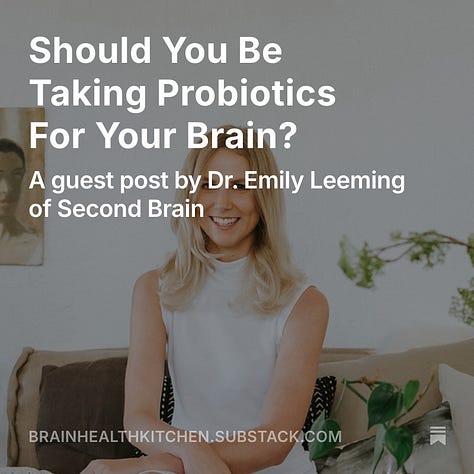
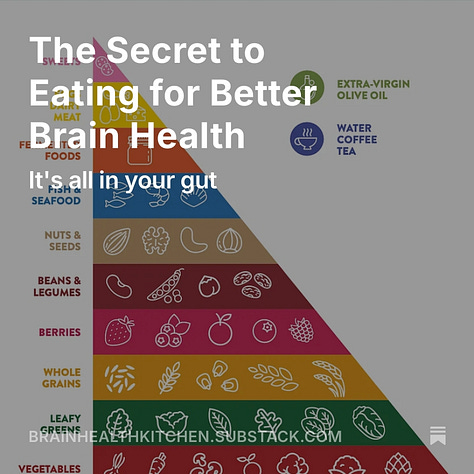
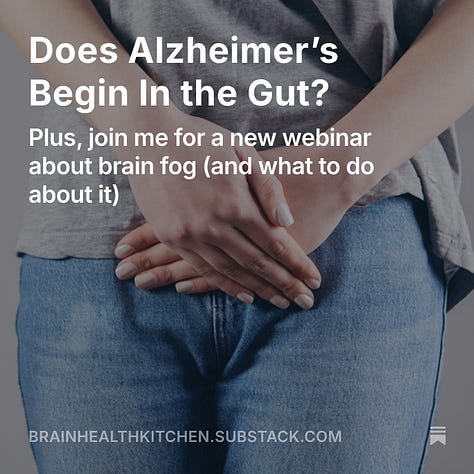
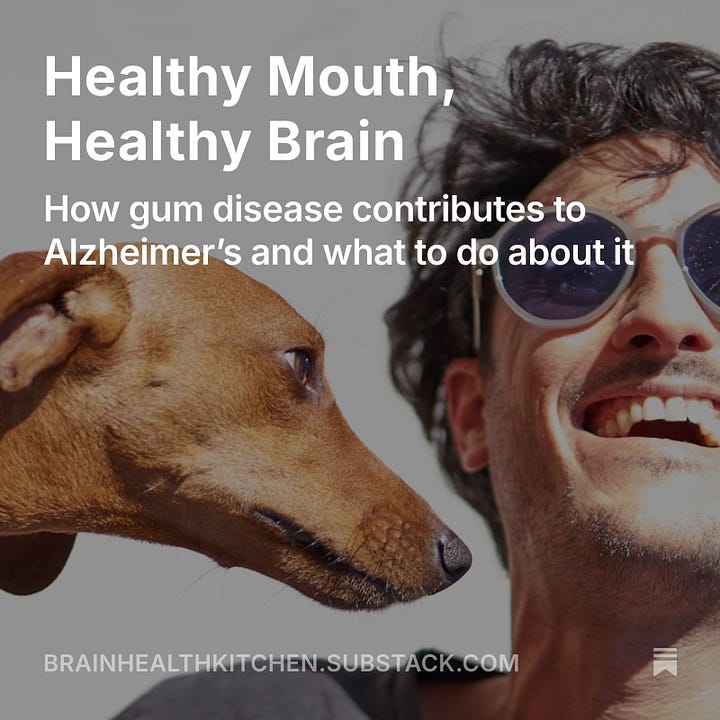
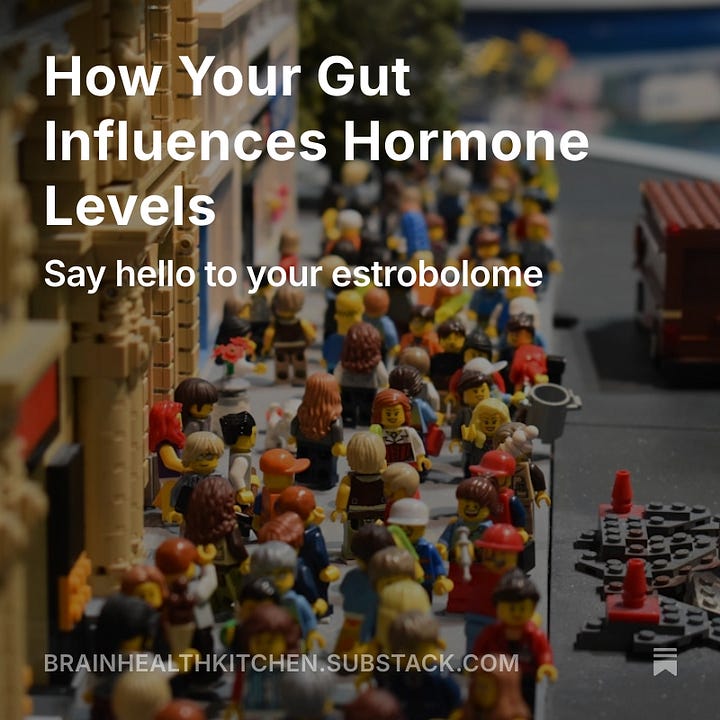
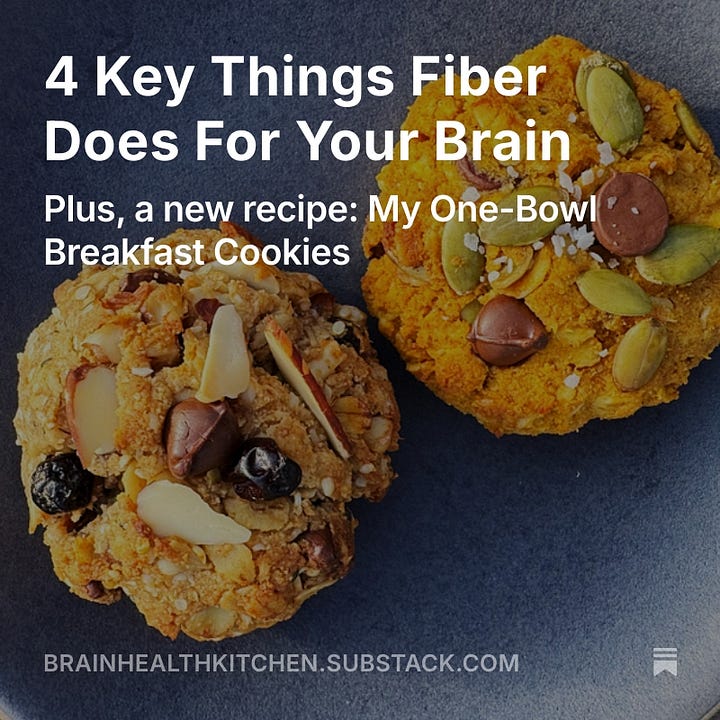
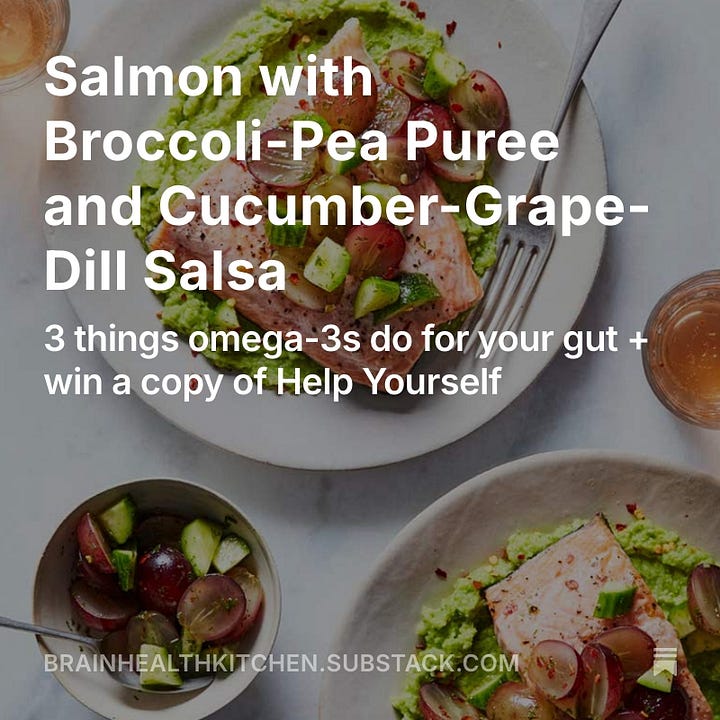
Does Alzheimer’s Begin In The Gut?
Should You Be Taking Probiotics For Your Brain?
4 Key Things Fiber Does For Your Brain
How Your Gut Influences Hormone Levels
The Secret to Eating For Better Brain Health
3 Things Omega-3’s Do For Your Gut
Healthy Mouth, Healthy Brain: How gum disease contributes to Alzheimer’s and what to do about it
Top 7 Gut Health Disruptors and How To Fix Them
First, do no harm is the axiom I learned in medical school, which turns out to be highly applicable to your friendly gut microbes. Unfortunately, despite our best intentions, modern life often gets in the way of good gut health. It doesn’t have to be that way. Here are seven disruptors to watch out for.
1. A diet that lacks diversity
Here’s an astounding statistic: 75% of the world’s food supply comes from 12 plants and five animal species. Not only that, ultra-processed foods (UPFs) now account for more than half of calories consumed in the U.S., Canada, and the U.K. Even if one is eating whole foods and avoiding UPFs entirely, a narrow, non-diverse dietary pattern can be a gut health liability. A lack of diversity within the gut bacteria limits recovery from harmful influences, such as infection or antibiotics (more on that, below.)
The fix: Try to consume at least 30 unique plant foods each week. Swap in at least one new-to-you whole food (such as jicama instead of carrot sticks, purple cauliflower instead of white, celery root instead of parsnips). This can change the diversity of your gut microbiome profile in just a few days. Reference this post to see what diversity looks like.
2. Misuse of probiotics
There are pros and cons to taking a probiotic supplement, as Dr. Emily Leeming so eloquently explained in this guest post on BHK. The wrong probiotic may not be helpful, and it could actually impair the recovery of the gut from disruptors like antibiotics.
The fix: Be intentional with probiotics. Know what you are taking, for what reason, and for how long.
3. Not getting enough sleep
Skimping on sleep creates a domino effect all the way down to your tiny gut microbes. Short term sleep deprivation (like when jet lagged or cramming for exams) can induce dysbiosis (gut microbiota imbalance). Of course, getting enough good-quality sleep is also foundational for brain health.
The fix: Prioritize getting enough sleep, even on weekends. While jet lag may be unavoidable due to traveling, staying up late on weekends can lead to what’s called “social jet lag” on Monday morning. Find my top 10 sleep tips here.
4. Environmental toxins
There is a long list of toxins common in daily life known to disrupt gut health. Avoiding these toxins requires a strategic approach. These include heavy metals (lead, mercury, arsenic, and cadmium (often found in chocolate); pesticides and herbicides; antimicrobials in personal cleaning and care products, endocrine disrupting chemicals, microplastics.
The fix: Eliminating all toxins may not be possible, but you can greatly limit your exposure in the food and personal care products you consume. I’ll be covering environmental toxins and their impact on the gut-brain-axis in an upcoming mini-series. In the meantime, give your personal care products a gut health check-up with Environmental Working Group’s Skin Deep database. Check out the Think Dirty app to find ingredients of concern.
5. Drinking too much alcohol
Heavy drinking is clearly bad for the brain, but it also induces dysbiosis in the gut. This comes from reduced microbial diversity, loss of beneficial bacteria, and sometimes, increased intestinal permeability (aka leaky gut).
The fix: A low or no alcohol policy is best for your gut and brain. If you drink, consider choosing red wine. The polyphenols in red wine (compared to other alcoholic beverages) may counteract some of its gut-harming effect.
6. Emulsifiers in foods
Emulsifiers are common additives found in processed foods. Though they’re FDA-approved and categorized as GRAS (generally recognized as safe), consumption has been linked to gut inflammation and microbiome disruption, and even an increased risk of colon cancer. Caveat: most of the studies of emulsifiers have been in animals, not humans. One of the few human studies of 22,000 French people raises a red flag that these common food products may have negative health outcomes that are mediated via the gut microbiota.
The fix: When shopping for food products, scan the ingredient list for these food additives: carrageenan, soy lecithin, guar gum, xanthan gum, ammonium phosphatides. Limiting emulsifiers in the diet is also a way to weed out ultra-processed foods, a good thing for both your gut and your brain.
7. Unnecessary antibiotics
Sometimes antibiotics are necessary to treat or prevent disease. But far too often they are over-prescribed, resulting in collateral damage to our beneficial gut microbes. Antibiotic scarring refers to the aftermath of even a single course of antibiotics—reduced numbers and diversity of beneficial bacteria, such as Bifidobacteria and Lactobacilli, and even an increase in harmful bacteria like Clostridium. A balanced, resilient gut microbiome can usually bounce back quickly from a course of antibiotics. If even mild dysbiosis (imbalance) is present, however, recovery can take months.
The fix: When antibiotics are medically necessary to treat or prevent disease, practice gut PREHAB—a proactive approach to take care of your gut microbes. Up your intake of plant foods, including fermented foods, and avoid UPFs. Sometimes a probiotic may be indicated. Upon finishing the antibiotics, keep up your gut REHAB by doubling down on your gut-healthy diet, while paying attention to all the factors we’ve discussed.
Takeaway:
Even though your gut microbiota are vulnerable to life’s toxins, they can also be a resilient bunch. In fact, our friendly gut bugs are not that much different than us. They require a diverse, whole foods diet to thrive. Just like us, they need good quality sleep. They don’t like to be bombarded by toxic substances. And they certainly don’t appreciate having their numbers culled by antibiotics. Avoiding these factors will help give you a resilient gut microbiota, able to bounce back from the disruptions common in modern life, such as jet lag or antibiotics or a bout of food poisoning. Take care of your gut microbes and they will help take care of your brain!
That’s all for today
I can’t believe how much we covered in this gut-brain-axis mini-series. If you have been following the whole series, please be proud of all that you’ve learned. You are gut microbiome experts now! I’ll be back this weekend with a list of top takeaways.
Please share the number one actionable thing you learned about the gut-brain-axis. How will you fold this into your brain healthy lifestyle? I would love to know.
I will also be sharing a new gut and brain-friendly recipe. If you’ve ever wanted to have tiramisu for breakfast, this one’s for you.
Until then, thank you for being part of the BHK community. I appreciate each and every one of you.
Love,
Annie
Brain Health Retreat Updates
Want to join me on a Brain Health Retreat this year? Your brain will thank you! My spring retreats are fully booked, but there are a few spots left in each of these retreats in Mexico, Italy, and Costa Rica. For detailed information about each trip, click on the links below or tap on RETREATS on the homepage.
BHK Retreat at Rancho La Puerta, Mexico June 7 to 14, 2025. Join me at the Ranch during Brain Health Week for a special retreat within a retreat. To register or submit questions, contact Donna Sher at 858.449.3672 or email her at dsher52@hotmail.com.
Sardinia’s Secrets For a Long and Healthy Life, October 12 to 19, 2025. Just announced! Join me this fall to explore Italy’s blue zones. Find all the details here; call 877-298-9677 for more information and to reserve your spot. This Brain Health Retreat was featured in National Geographic Traveller UK.
Costa Rica in February 5 to 10, 2026: Spots are filling quickly for this jungle and beach retreat. Learn more and reserve your spot here. Health Kitchen is a reader-supported publication. To receive new posts and support my work, consider becoming a free or paid subscriber.Brain Health Kitchen is a reader-supported publication. To receive new posts and support my work, consider becoming a free or paid subscriber.




Great series, Annie!
I know that I need to eat a more diverse diet. I tend to stick to the same foods day in and day out and find it challenging to break from them. Thanks for this reminder - I’ll work on it!
Thank you as always for this helpful information. Do you have any thoughts on whether the common supplement Benefiber is helpful or harmful?